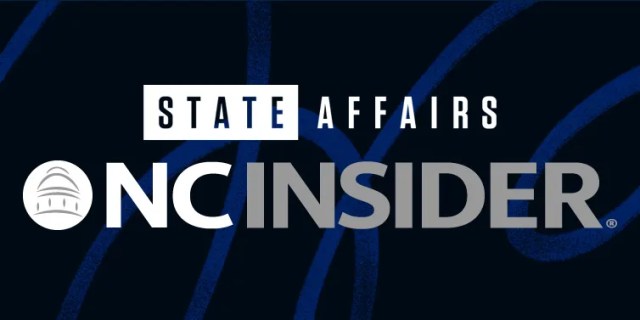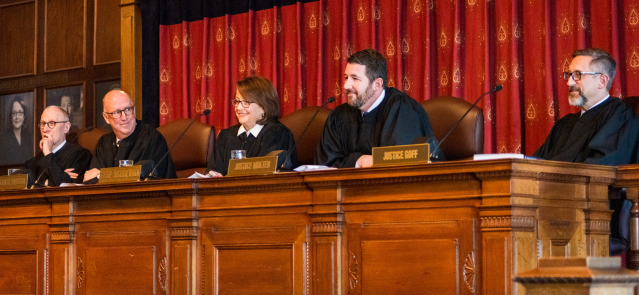YOU DON’T SAY
“While we’re watching pennies and paper clips, they could snap their fingers and make this situation go away.”
State Treasurer Dale Folwell, on legislative control over funding to keep the state health plan solvent. (Carolina Public Press, 8/19/24)
Weatherization Program
Adam Wagner, The News & Observer, 8/19/24
A program to help some of North Carolina’s poorest residents cool their homes in the summer and heat their homes in the winter has seen a slow start, frustrating nonprofit agencies across the state that are in charge of weatherization.
The N.C. Department of Environmental Quality’s Weatherization Assistance Program is funded by the federal government. Once the state receives that money, it reimburses local partners who work throughout North Carolina. Those partners, often community action agencies, identify people with low incomes who could benefit from services like having insulation installed or upgrading their HVAC systems. The Weatherization Assistance Program is available to people whose household incomes are less than 200% of the federal poverty level. That’s $39,440 for a two-person household or $60,000 for a family of four.
DEQ says the program typically helps about 1,600 households annually. North Carolina nonprofits received updated contracts from DEQ Thursday, nearly eight weeks after the weatherization program’s fiscal year started.
Without those contracts finalized, nonprofit leaders say, they cannot push forward with work to protect their clients’ homes — and finances. The delay was due to “programmatic changes” at the federal level that required DEQ to overhaul the contracts, Sascha Medina, a DEQ spokeswoman, wrote in an email.
Those changes are coming even as the weatherization program saw a reduction in federal funding, a result of pandemic-era safety net spending not being renewed. DEQ expected to receive about $24 million to support weatherization this year from the federal government’s Low Income Home Energy Assistance Program and Heating and Air Repair or Replacement Program. Instead, Medina wrote, it received $15.8 million. But community action agency leaders across North Carolina say communication has been lacking, leaving the weatherization program in limbo throughout a stifling summer and with western North Carolina’s first frost rapidly approaching.
“They’re on us about making sure we meet our quota each month or quarterly or they’re threatening to take the funds away from us. How can we start to work if we don’t have a contract?” asked Stephanie Ashley, the executive director of Blue Ridge Community Action.
DEQ officials insist they’ve kept their partner agencies updated about where the contract stands, holding several conference calls and offering to follow up with answers to individual questions.
Upon learning about the funding reduction, Medina wrote, DEQ told partners they could continue paying weatherization employees on staff but would need to wait until the contracts were signed to receive reimbursement for any weatherization projects.
Landon Mason, the executive director of the Economic Improvement Council, is among those who are frustrated with DEQ. Mason’s agency serves a 10-county northeastern North Carolina region from Dare County west to Washington County and north to Gates County. Mason and several other community action agency executive directors The News & Observer interviewed called for a change in leadership at the Weatherization Assistance Program.
Communication was a consistent theme, with Mason saying it sometimes takes DEQ staff weeks to respond to emails with questions and that Zoom calls with agency partners are set up so only department staff can speak. Notification that this year’s contracts wouldn’t be ready in time for July 1 came on Friday, June 28, causing several community action agencies to scramble to cancel jobs that were already scheduled. And agencies are bristling about monthly reports that can run into the hundreds of pages, something Ashley and other directors take up too much time when the weatherization programs must already audited.
“It’s almost like there is no partnership here, there is no collaboration,” Mason said.
DEQ Secretary Elizabeth Biser maintains confidence in Weatherization Assistance Program staff, Sharon Martin, a DEQ spokeswoman, said in an email Friday.
“They are dedicated public servants, working to ensure that the resources provided through this program are benefiting low-income residents and that those funds are being spent appropriately and efficiently. We all share a goal of helping as many North Carolinians in need as possible while serving as responsible stewards of taxpayer funds and making sure those funds are going to their intended use,” Martin wrote.
Statewide, more than 2,700 people are waiting for weatherization assistance. [Source]
School Investors
Luke Fountain and Gavin Off, The Charlotte Observer, 8/19/24
Millions of dollars are flowing from private equity firms into charter schools across North Carolina to help buy new classroom materials, renovate and expand. Unlike traditional public schools, charter schools historically have been responsible for finding their own ways to pay for capital needs. That means using donations, grants or nonprofit and private investments for renovations, new construction and upgrading classroom materials — crucial for attracting teachers, parents and students.
One prominent firm helping charter schools in North Carolina is Chicago-based B.C. Ziegler and Company, a niche investment bank, that facilitated loans, acquisitions or debt refinancing of six North Carolina charter schools in the past four years: Unity Classical Charter School in Steele Creek, The Franklin School of Innovation in Asheville, The Capitol Encore Academy in Fayetteville, Bonnie Cone Classical Academy in Charlotte, The Point College Prep & Leadership Academy in High Point and Pine Springs Preparatory Academy in Holly Springs.
Ziegler’s work totals $97.49 million, but it’s just one firm making investments.
A Charlotte Observer analysis reveals at least $279 million in private equity investments in North Carolina charter schools since 2013. The investors range from large national firms to smaller regional players, signaling a renewed enthusiasm for an industry investors are targeting. Proponents argue investments are essential for the survival and growth of the partially state-funded schools, while critics worry about risks and a lack of oversight.
One of the risks is schools losing their buildings while investors profit, say critics with the Network for Public Education Foundation and the N.C. Justice Center. The buildings could also be sold for other projects or used for future charters because relatively few buildings are built for that purpose, according to critics. Investors, though, say they have the best interest of students in mind and don’t want any of their schools to close.
The number of charter schools has grown to 210 since the General Assembly removed a 100-school cap in 2011.
“There is a demand like never before,” said Bartley Danielsen, a member of the state Charter Review Board, which approves and revokes school charters. Statewide, charter school enrollment is expected to eclipse 145,000 students this year, according to the state Department of Public Instruction, as several schools are expanding to accommodate some of the more than 85,000 students on waiting lists.
However, the number of charter schools won’t grow for the first time since 2011. It’s projected to remain at 210, due to a shortage of available buildings and real estate, said Lindalyn Kakadelis, executive director of the North Carolina Coalition for Charter Schools.
“More students necessitate the need for more desks, books, classrooms and everything else,” she said. “Finding money isn’t a problem. The only thing that will slow down growth is finding real estate to set up new schools.”
State funding can be used for lease agreements on some property or mobile classrooms, according to state law. But charter schools receive almost all public money based on how many students are enrolled. Traditional public schools, meanwhile, receive per-pupil funding and money from local governments for building needs.
Donations, grants and nonprofit help are often insufficient, said Kakadelis, a former Charlotte-Mecklenburg school board member. Private equity firms like Ziegler step in offering loans, tax-exempt bonds and other financing options.
The most common financing tool for charter schools is a tax-exempt bond, a specialty of Ziegler’s.
Ziegler connects schools with investors who want to purchase tax-exempt bonds and are willing to accept lower interest rates for the tax benefit, said managing director Scott Rolfs. The bond proceeds go toward school upgrades and are seen as more manageable for schools because repayment spans 30 to 40 years like a home mortgage.
Part of the way Ziegler determines if bond issuance is the best choice for a school to raise capital is through the debt underwriting process. That’s where Ziegler evaluates a school’s financial health to determine the best strategy to raise money, be that through bonds, other loans or other options and then connects the school with potential investors who can offer them.
Statewide, advocates and opponents generally agree that, once operational, charter schools face similar levels of oversight to traditional public schools. Schools submit audits to state officials and undergo academic, facilities and disability compliance reviews when seeking or renewing their charters. “What we traditionally think of as accountability, they have the same testing requirements and the state monitors their finances like any other public school,” said Kris Nordstrom, a senior policy analyst with the left-leaning nonprofit N.C. Justice Center.
However, there are no regulations about where or how charter schools get money for capital improvements or rules to ensure they repay private investors, review board member Danielsen said. There is no state review before a contract is signed.
The lack of state oversight before contracts are signed raises fears that charters are cutting risky deals with investors more interested in profits than student success.
Currently, 62 of North Carolina’s 210 charter schools are classified as low- or continuously low-performing academically. Likewise, nearly a third of traditional public schools were designated low-performing last year.
Half of the schools who borrowed money through with Ziegler’s help are low performing according to state guidelines: Bonnie Cone Classical Academy, The Capitol Encore Academy and The Point College Prep & Leadership Academy.
The Charter Review Board is in charge of renewing and revoking charters based on the state statute. N.C. General Statute 115C-218.6(b) Critics also draw parallels to private equity’s involvement in education to its involvement in other “traditionally public sectors” like health care and housing. Private firms occasionally have acquired hospitals and nursing homes, increasing debt and cutting costs that sometimes jeopardized patient care, according to research from Harvard University and the National Bureau of Economic Research.
Similarly, the housing market has seen private firms amass large portfolios of rental properties, sometimes driving up rental rates and contributing to housing shortages, displacing tenants and rising rents, according to reporting from The Charlotte Observer and The New & Observer.
Advocates in the charter movement hope state lawmakers change how the charter financing system works. “I would like to see the state be innovative and look at other revenues that charter schools could use to get facilities,” Kakadelis said. “I mean, it is almost impossible for charter schools to start because they go a year or two years before even getting a dime from the state.” [Source]
State Health Plan
Jane Winik Sartwell, Carolina Public Press, 8/19/24
The North Carolina State Health Plan may be unable to stay afloat by fall 2026, according to State Treasurer Dale Folwell. Why the state legislature is withholding the funds needed to keep the plan solvent remains a mystery.
COVID-related expenses and skyrocketing prescription drug and health care costs are wreaking havoc on the State Health Plan’s budget: the plan is facing a projected loss of $106.3 million in the upcoming fiscal year, according to a July report. Price increases are vastly outpacing the budget, which was rocked by the pandemic.
The plan provides health insurance for 750,000 state employees, teachers, retirees, and dependents — that’s more than 15% of all North Carolinians with employer-sponsored insurance. Those covered by the plan — public school teachers, police officers, and park rangers, for example — face higher premiums and limitations on prescription drug offerings. The plan stopped covering blockbuster drugs for weight-loss like Ozempic back in March.
“We are scrubbing our prescription drug offerings,” Folwell told Carolina Public Press.
The state is also switching from Blue Cross Blue Shield to Aetna for coverage on Jan. 1, 2025, a move that Folwell estimates will save tens of millions of dollars.
The plan has spent $538.8 million on COVID-related expenses through July 2024. Only $215 million of that has been reimbursed by the state budget, which is currently operating on a surplus. The state received $110 billion in pandemic relief funds from the federal government. Nearly 60% of that money remains unspent.
State Treasurer Folwell, a Republican and former second-in-command in the state House, is asking the Republican-controlled state General Assembly for $250 million to keep the plan solvent in the short term. For now, legislators seem to be ignoring his call. “We have one person to go to to get our funding, and that’s the General Assembly,” Folwell told CPP.
“They have the keys to the car. They … are going to determine whether this car continues to roll down the road …. While we’re watching pennies and paper clips, they could snap their fingers and make this situation go away.”
Senate leader Phil Berger did not respond to a request for comment on the legislature’s motivations for withholding the money from the State Health Plan. He is not responding to Folwell’s calls or emails either, according to the state treasurer.
“Why is the General Assembly not fully funding the state’s healthcare plan?” wonders Joseph Harris, fiscal policy analyst at the John Locke Foundation, a North Carolina-based conservative think tank. “They make sure to fund the state retirement plan each fiscal year, but they have not been doing that with the state health plan. As far as understanding that politically, we don’t know yet.”
Looking at how they have spent the federal pandemic relief money so far can offer a clue: it appears the General Assembly’s biggest concern is reviving business in the state. The legislature has spent more than $17 million on business aid, and less than $3 million on assisting health providers.
Another partial explanation is that legislators may be just as fed up with rising costs as the State Health Plan board. The state legislature has been spending more and more money on state employee benefits over the years.
Between 2009 and 2024, the number of state employees rose 0.7%, while the price of benefits for those employees increased 102.9%, according to the General Assembly’s fiscal research division.
Harris, of the John Locke Foundation, says a potential solution is reference-based pricing. “There’s no way around it: the General Assembly is just going to have to put up money,” Harris said. “But at the same time, the state needs to be better about trying to figure out a way to get these costs down.”
“Reference-based pricing would give a patient a reasonable and customary price for a procedure, saying ‘Hey, this is about what it should cost to get an MRI on your leg,’” Harris said. “It would create more of a negotiation process between the health care provider, the insurance provider and the actual patient.” [Source]
Student Laptops
Emily Walkenhorst, WRAL News, 8/19/24
Most North Carolina public schools say they don’t have the money to replace laptops issued to students in recent years — a scenario that could leave hundreds of thousands students without computers if they break down, an analysis of state data obtained by WRAL News shows.
Many of the machines were purchased using federal stimulus dollars issued during the Covid-19 pandemic.
Without new funding, the boom in laptop purchases that turned nearly every school into a “one-to-one school” — one device per student — would be a blip in time.
Most students have received Chromebooks, lower-cost devices that use web-based apps instead of traditional software programs and that once lasted just four years.
Since 2020, schools have spent $448 million in stimulus funds on computer equipment for students and staff, data maintained by the North Carolina Department of Public Instruction shows. It’s unclear where schools will get that kind of money again.
The Department of Public Instruction surveyed 301 public school systems and public charter schools from April through June. Of those, 82 public school systems and 93 charter schools said they had no funding source to replace their devices whenever they break down.
Schools recently got a bit of good luck: Google announced in November that it will provide support for Chromebooks for 10 years, instead of just four.
Most schools bought Chromebooks in 2020 and 2021. The extension provides a reprieve for many school systems that previously planned to trash the laptops once security software stopped working on them. Now as the devices age, schools are eyeing whether the hardware will last that long — especially in the hands and backpacks of children.
“If districts don’t really have a tech obsolescence plan and these Chromebooks start to die down, we go back to where we were two to three years before the pandemic,” said Merve Lapus, vice president of education, outreach and engagement for Common Sense Media, which evaluates children’s use of technology and media. “We were just looking at getting reliable connectivity into our schools and our communities, and now we might have connectivity without any devices.”
Many schools are also working toward stricter bans on cellphones in classrooms, he noted. Without a smartphone or a laptop, students would have no access to technology during lessons, he said.
Wake County school officials told WRAL News they’re estimating the devices will last about five years, but they acknowledged many devices are already pushing up on that time and may still be in good shape. The district is among those that haven’t identified a funding source for replacement.
Replacement parts for Chromebooks aren’t easy to find, compared to other laptops, making them harder to repair, said Lucas Gutterman, director of the Designed to Last campaign at U.S. Public Interest Research Groups. Gutterman’s organization pushed Google to increase the lifespan of Chromebooks months before the company announced its change.
“We’re going to keep pushing Google and all manufacturers to actually just design tech to last,” Gutterman said, “to help save students money, but also just to reduce the electronic waste that all of this tech is producing.” Doubling the lifespan of Chromebooks would save U.S. schools $1.8 billion, assuming no extra maintenance costs, his group estimates.
In North Carolina, schools often don’t allow younger children to take the devices home. Some school systems require high school students to pay a deposit toward potential repairs to be able to take them home.
The North Carolina Department of Public Instruction surveyed school systems in 2022 and found most didn’t have a future funding source once the federal money ran out. Officials found in the most recent survey that the reality hasn’t hardly changed.
With time and money running out now, schools say they don’t have another funding source for all of the laptops, although it’s possible they may have funding for some of them. The problem: They’ve never had a regular source to fund the laptops and they bought the laptops in bulk, meaning replacement could come due for all of them at the same time, rather than staggered over a few years.
In the school systems that have identified a funding source, many of them were already offering a computer to every student before the pandemic. They often used private donations to make that happen, like in Charlotte-Mecklenburg Schools and Person County Schools.
Schools receive some regular technology funding from the state and counties via revenues collected through the court systems — from fines and forfeitures connected to all kinds of cases. That funding source has been the subject of some tension. A superior court judge as recently as 2019 ordered the state to pay more than $700 million in fines and forfeitures that should have gone to K-12 schools but didn’t for over a decade.
Some lawmakers have filed bills to cover the payment, but they have not advanced to the committee stage. [Source]
Robinson Strategy
Will Doran and Jack Hagel, WRAL News, 8/19/24
Lt. Gov. Mark Robinson’s recent abortion ad — in which the Republican gubernatorial candidate details his decision years ago to pay for his girlfriend, now wife, to get an abortion — represents a new tactic he’s been trying to take on the subject of abortion, Robinson said recently on a conservative talk radio show.
“I have not changed my view about abortion, but I’ve changed my approach to it,” Robinson said. “Because I really believe that if I’m a person who is seen as an individual who’s standing on stage pointing down at a young woman saying, ‘You can’t have an abortion,’ that is not the right approach.”
The shift, detailed in an interview on Charlotte conservative talk radio station WBT, comes as Robinson’s strict views on abortion — and his negative comments about the women who get them — are themselves the subject of an ad his Democratic opponent, Josh Stein, is running against him.
Stein, the state’s current attorney general, kicked off the TV ad wars earlier this summer with an ad that featured several clips of Robinson calling for abortion bans and criticizing women who get abortions as being “not responsible enough to keep your skirt down.”
Public polling has since shown Stein significantly ahead of Robinson in the race for governor. Robinson criticized Stein’s ads that used clips of him speaking, saying on the radio show that he felt some of the comments were taken out of context. And Robinson said he hopes his own abortion ad helps put out a different image of him as the race enters its final months.
A recent poll by The Telegram found Republican Donald Trump up 3 percentage points in North Carolina, but it also found Stein leading Robinson by 6 percentage points. Another recent poll by The New York Times found Democrat Kamala Harris leading Trump by 2 in North Carolina, and Stein leading Robinson by 10.
Robinson said in the talk radio interview that he hopes his new ad shows voters that he now believes that rather than speaking down to women on the topic of abortion, “the right approach is to come down off the stage, embrace that young woman and tell them about the reasons why I believe she should choose life.”
“I stand by our current law,” Robinson says in his new ad, about a law that bans abortion after 12 weeks, not six, and extends the cutoff to 20 weeks in cases of rape or incest.
Stein’s campaign said voters shouldn’t believe Robinson’s new ad and seemingly softer stance on abortion, suggesting that voters instead pay attention to his years’ worth of previous statements on the topic.
“Mark Robinson knows North Carolinians can’t stomach his beliefs that abortion should be banned ‘for any reason’ and that women have abortions because they ‘can’t keep their skirts down,’ so he has resorted to running from his record and misleading voters,” Stein spokeswoman Morgan Hopkins said in a news release.
While Robinson says in the ad he supports the current 12-week ban, it’s unclear if he would still push for further restrictions if he becomes governor, as he has said in the past he would.
In November, Robinson’s campaign spokesman, Michael Lonergan, said that the lieutenant governor would support what’s known as a heartbeat bill and exemptions “for extreme situations like rape, incest, or when the life of the mother is in danger.” A heartbeat bill typically bans abortion after the sixth week of pregnancy.
Lonergan told WRAL Monday that “the legislature has already spoken on this issue. As governor, Mark Robinson will work to make North Carolina a destination for life by building a culture that does more to support women and families, including bolstering adoption, as well as foster and childcare.”
Robinson said in the interview he wants voters to know that he can keep his personal beliefs on abortion separate from what he’d do on the matter if elected governor.
“I’m serving 10 million people, all of whom do not share my opinion,” he said. “So I have to be mature enough to move past my opinion and realize that we govern by consensus when it comes to our current law. Our current law is 12 weeks. It used to be 20. We had a healthy debate about that. I pushed for six weeks. I’m not shy about saying that. But my colleagues in the Senate and the House, they came up with a bill that said 12 weeks, with exceptions for rape and incest and life of the mother, which I agree with, and we passed that bill. And I am mature enough to accept that.” [Source]
Digital IDs
Laura Leslie, WRAL News, 8/19/24
The North Carolina State Board of Elections will decide Tuesday whether to accept the digital version of University of North Carolina at Chapel Hill’s student ID as a form of photo voter ID.
UNC Chapel Hill students can still get a physical ID card on request, but incoming students are transitioning to primarily using a digital student ID on their phone, which they can use to access buildings and pay for meals.
UNC’s physical student ID has already been approved for use as a voter ID. But Republican state elections board member Stacy Eggers objected to including the digital version, so the board will take a formal vote on it Tuesday.
Whatever they decide, this issue isn’t going away anytime soon. The University of North Carolina is one of many schools moving to mobile student ID cards for everything from access to buildings to paying for food. The question also goes well beyond just college campuses. According to ZDNet, at least 11 states have digital driver’s licenses: Arizona, Colorado, Connecticut, Georgia, Iowa, Louisiana, Maryland, Mississippi, Missouri, New York and Utah.
In July, state lawmakers directed the North Carolina DMV to roll out its own digital driver’s license program by summer 2025.
However, the North Carolina law specifies that the digital license is “supplemental.” Several other states do the same, like Georgia, which doesn’t accept its digital license as a substitute for the actual document if a motorist is pulled over.
It’ll likely be up to state lawmakers in 2025 to decide whether digital licenses can be used at the polls. [Source]
ECU Health Expansion
Sharryse Piggott, WUNC Radio, 8/19/24
Acute care happens when an adult or elderly person needs short term care in a hospital or nursing home due to an illness like pneumonia, which can cause more complications. East Carolina University and ECU Health are launching a new graduate-level certificate program aimed at getting more nurse practitioners in acute care settings for adults and the aging population.
It’s called the Adult Gerontology Acute Care Nurse Practitioner program. ECU Health donated a grant to the university for $1.5 million to fund it over a five-year period. University officials said the acute care program is the first of its kind in Eastern North Carolina.
Acute care happens when an adult or elderly person needs short-term care in a hospital or nursing home due to an illness like pneumonia, which can cause more complications.
“It could also be that person that has a chronic condition and gets COVID-19, or some other type of illness that they need to come in for respiratory intervention or some other intervention as a result of that,” said Pam Rudisill, ECU Health’s Vice President for Nursing. Rudisill added that the program is meant to help expand the acute care workforce.
There are only about 6.1% of nurse practitioners that go into the acute care gerontology field, according to the American Association of Nurse Practitioners. [Source]
Protest Report
Amy Diaz, WFDD Radio, 8/19/24
Back in May, law enforcement officers were called to disband a pro-Palestine rally and encampment at Wake Forest University. A committee charged with reviewing the school’s response to the protest released their findings last week.
The After Action Review Committee is made up of six faculty and staff members. Over the course of seven weeks, the group spoke with 43 individuals involved in the events including administrators, staff and students.
According to the committee’s report, some believed the response to the pro-Palestine demonstration was appropriate. But others felt the use of law enforcement deviated from the university’s cultural norms, and that the administration had shown a bias in favor of those who support Israel.
The committee didn’t endorse any one perspective, but offered four recommendations for the university moving forward. One was to adopt a written protocol to guide decisions around deploying police in the context of campus demonstrations. The committee also recommended the university adopt “reasonable time, place, and manner guidelines applicable to campus-based protests and demonstrations,” which the university did earlier this month. On Aug. 1, the WFU administration released a new University Policy on Demonstrations, Chalking, and Posting, which the committee said provides “greater clarity.”
In a letter to the Wake Forest community, President Susan Wente wrote that she accepted the recommendations.
“Freedom of expression and academic freedom, including the right to demonstrate, are foundational to our academic mission,” Wente said. “I am confident that the Committee’s recommendations will further improve how the University prepares for and responds to future demonstrations.” [Source]
Apprenticeship Grants
News Release, 8/19/24
Monday, Gov. Roy Cooper announced the North Carolina Business Committee of Education (NCBCE) has been awarded $4 million from the U.S. Department of Labor to expand the use of Registered Apprenticeship Programs (RAPs) in high-demand fields. This grant is part of the Biden-Harris administration’s $195 million investment through the Apprenticeship Building America program.
NCBCE’s NC Career Launch will create a statewide youth apprenticeship system, developing and scaling programs for high school students that lead to RAPs in critical sectors. These programs will provide a seamless pathway to post-secondary education and a career with family-sustaining wages.
“For five years in a row, North Carolina has been ranked a top destination for business thanks to our highly-skilled and diverse workforce,” said Cooper. “NC Career Launch will continue to strengthen our already great public schools and workforce training programs by providing new pathways for high school students to prepare for the jobs of today and tomorrow.”
The program will develop, pilot, and scale pathways in advanced manufacturing, clean energy, early childhood education, healthcare, and information technology/cybersecurity. Students will receive instruction through Career and Technical Education (CTE) or dual enrollment at local community colleges, participate in work-based learning, and earn industry-recognized credentials. Upon high school completion, students can continue into a RAP and complete their community college degree at no cost through the NC Apprenticeship Tuition Waiver.
Jail Death
Ryley Ober, Asheville Citizen Times, 8/19/24
The N.C. Department of Health and Human Services has completed its compliance investigation into a detainee’s death in the Henderson County Detention Center, finding no deficiencies.
Alan Green, 42, of Hendersonville, was arrested on June 25 and held under an $80,000 bond with a charge of attempted second-degree forcible sex offense. Eight days later, Green was “found in distress” at 2:18 a.m. on July 3, according to a DHHS compliance inspection report obtained by the Citizen Times. Jail officers must make irregular rounds and observe each inmate twice in 60 minutes with no more than 40 minutes in between rounds, according to state guidelines. The last supervision round where Green was seen alive was at 1:55 a.m. July 3, according to the Henderson County jail’s death report sent to DHHS and obtained by the Citizen Times.
Green died in the jail at 2:33 a.m., five minutes after he was found in distress, the DHHS investigation report said.
The Henderson County Sheriff’s Office, which maintains and operates the detention center, submitted a death report to DHHS — the state agency that oversees jail compliance — on July 3, as all jails are required to do within five days of an in-custody death. Sheriff Lowell Griffin told the Citizen Times on Aug. 16 that his office notified DHHS “within hours of the event.”
DHHS conducted a compliance investigation of the detention center for three hours on July 24 to see if correction officers acted in compliance with state law and if the jail had any deficiencies that may have contributed to the death.
“There were no deficiencies determined during the compliance investigation,” the report said. “No further action is required at this time.” The investigation cited the jail’s death report, which “indicated that the manner of death was listed as natural.” [Source]
Mecklenburg Air Quality
Zachary Turner, WFAE Radio, 8/19/24
North Carolina is coming up with a plan to meet stricter federal air quality standards. The new standard for fine particulate matter is 9 micrograms per cubic meter. That includes air pollutants produced by wildfires, cars and industrial sources. Peter McGrath, chair of Mecklenburg County’s Air Quality Commission told county commissioners earlier this month, the county is below the new standard, but only barely.
“Our actual number will be less than 9, but not a lot less. So, that’s going to have to be another area — with ozone — that will have to be an area of focus going forward,” he said. State regulators are hosting a webinar on Monday at 6 pm to discuss the state’s plan to meet these new standards. [Source]
Endowment CEO
Madison Lipe, Wilmington StarNews, 8/19/24
The New Hanover Community Endowment has chosen a new president and CEO. Dan Winslow has served in various roles across the business, legal, legislative and nonprofit industries. He was a former Massachusetts judge, legislator and chief legal counsel to former Massachusetts Gov. Mitt Romney.
The nationwide search was led by moss+ross, a consulting firm that focuses on strengthening North Carolina nonprofits. The firm has provided consulting to more than 265 state nonprofit and educational organizations over the last 15 years, according to a release from the endowment.
“The enthusiasm nationwide to lead our team was evident in the number of strong applications we received for this position,” said Board Vice Chair Shannon Winslow, who led the endowment’s CEO search committee, according to a news release. “Dan is the best person to take the reins and lead this organization toward transformational change in our community, now and into the future.”
The endowment noted that although they share the same last name, Dan Winslow is not related to Shannon Winslow. [Source]
Rental Hotline
DJ Simmons, WFDD Radio, 8/19/24
The city of Greensboro is launching a hotline for residents to report issues with short-term rentals in their neighborhoods. Regulations for people operating properties like Airbnbs went into effect in April. The city’s new hotline allows residents to call or submit reports online if they have concerns a building isn’t in compliance with the rules. According to a news release, this would help officials effectively manage short-term rentals.
Greensboro defines these properties as rentals of a “portion or all of a residentially used property for a period of no more than 30 days.” Under the city’s ordinance, they are only allowed in residential dwellings. Owners also have to apply to receive a zoning permit. No more than one unit, or 25% of units within a multifamily building, can be used for a short-term rental. Other rules limit parking and include a maximum of two adults allowed per rented bedroom.
Since the ordinance took effect the city has received 453 applications and has denied 47. [Source]
Rowan Bench
Elisabeth Strillacci, The Salisbury Post, 8/18/24
With the swearing-in Thursday afternoon of now Judge B. Ashley Andrews, the district court bench in Rowan County now has more female judges than males, for the first time in history. Andrews was appointed by Gov. Roy Cooper to fill the vacancy left by the retirement of Judge R. Marshall Bickett.
Andrews will serve as District Court Judge in Judicial District 27, Rowan County. Andrews is the owner of B. Ashley Andrews, Attorney at Law, PLLC and serves as privately assigned counsel for Indigent Defense Services.
Andrews wasn’t allowed much time to celebrate, as she was on the bench in administrative court Friday morning.
Superior Court Judge Michael Adkins, who performed the ceremony after Judge Dixon came down with COVID, said he’s “observed and admired” Andrews work for some time. “She has tremendous attentiveness to clients and an investiture in the system,” he said. [Source]
High Enrollment
Rebecca Noel, The Charlotte Observer, 8/19/24
Johnson C. Smith University started a blitz Monday to raise $250,000 in 10 days because more students plan to enroll this fall than the historically Black college has seen in years. There were 1,102 students at JCSU in fall 2023.
This semester, 1,378 students are looking to enroll, including 604 new freshmen. This marks the highest enrollment the school has seen since before the pandemic. However, many students have difficulty affording the total cost of attending school. Without being cleared financially, students cannot register for classes — and the school is at risk of exactly that for hundreds of them.
“When we talk about an average gap for students, you’re looking at anywhere between $6,000 to $10,000,” said Davida Haywood, JCSU vice president of student affairs and enrollment management. “After whatever federal financial aid they receive or merit-based scholarships they may receive, what’s left is the responsibility of students and their families. We’re trying to help our students with that gap.”
JCSU announced early Monday it is asking community members donate to its emergency aid fund to help the influx of new students afford to attend.
“We are pleased to announce that we have accepted a record number of incoming students across all classifications for the fall 2024 semester,” JCSU Director of Communications and Marketing Cheryl Butler-Brayboy wrote in an email to the JCSU community. “We need to financially clear 300 students by Friday, Aug. 30, 2024.”
Classes begin Wednesday.
Students must be “financially cleared” – meaning they have all the funding they need to attend, including from scholarships – by that Aug. 30 deadline in order to continue to be enrolled. [Source]
Runoff Reduction
Trista Talton, Coastal Review, 8/19/24
Thousands of dollars in rebates are available for commercial businesses, owners of apartment complexes and other large-scale property owners who want to help reduce the amount of pollutant-laden stormwater runoff reaching two Wilmington watersheds. The city in January launched a green infrastructure cost-share rebate program, one intended to further boost ongoing efforts to cut down on the amount of runoff that flows from rooftops and other impervious surfaces during rainfall and into creeks and waterways directly downstream.
This new program specifically targets Bradley Creek and Hewletts Creeks watersheds, which collectively span a little more than 21 square miles and include connections to two Atlantic Intracoastal Waterway drainage areas.
Local government programs like the New Hanover County Soil & Water Conservation District that focus on helping residents install nature-based features like rain gardens and cisterns, and host rain barrel sales, have become increasingly popular, said Anna Reh-Gingerich, watershed coordinator of Wilmington Stormwater Service’s Heal Our Waterways Program.
The cost-share program offers rebates of up to $10,000 for eligible projects where property owners go above and beyond what the state mandates them to manage runoff from their properties.
Reh-Gingerich estimates that the annually funded program will help fund about two projects each year. These projects help implement further the Bradley and Hewletts Creeks Watershed Restoration Plan the Wilmington City Council adopted in 2012. [Source]
Statesville Hospitals
Donna Swicegood, Statesville Record & Landmark, 8/16/24
Iredell Health System announced on Friday that a definitive agreement to acquire Davis Regional Psychiatric Hospital from subsidiaries of Community Health Systems had been reached.
“For more than 70 years, Iredell Health System has provided high-quality health care for our community. Davis Regional Medical Center, now known as Davis Regional Psychiatric Hospital, has also been an integral part of the health care landscape in our area for more than 100 years,” said John Green, president and CEO of Iredell Health System. “We are excited to bring these two Statesville traditions together as one single health care entity. Doing so will provide more comprehensive, local health care with the combined expertise — totaling over 170 years — of both organizations.”
The transaction is subject to regulatory approvals and is expected to close sometime this fall. [Source]
Furniture Factory
Bradley George, WUNC Radio, 8/19/24
A Western North Carolina furniture factory that closed last year is reopening under new ownership, almost a year after the original owner filed for bankruptcy. Georgia-based Surya has resumed production of Mitchell Gold + Bob Williams furniture pieces in the town of Taylorsville in Alexander County, according to The Charlotte Observer.
Founded in 1989, Mitchell Gold + Bob Williams, named for the company co-founder and his longtime partner, earned global praise for its sleek, modern designs. But workers arrived at the plant late last August to padlocked gates and a sign that read “Mitchell Gold + Bob Williams has recently and unexpectedly learned that we are unable to continue business operations.” In a bankruptcy petition filed in September, the company said it shut down after it failed to receive promised funding from PNC Bank. Twenty-five retail stores in the U.S. and Canada also closed.
Surya, a home furnishings company based in Georgia, acquired the plant a few months later. It promised to reopen the factory in 2024 and “to reintroduce the brand as a trade-only partner, accessible to leading interior designers and design-driven retailers. Classic MG+BW designs and quality will be preserved and celebrated under Surya’s stewardship.” Fifty Mitchell Gold + Bob Williams pieces are now available through Surya’s website, with a full re-launch of the product set to begin this fall.
At its peak, Mitchell Gold + Bob Williams employs about 700 people at the Taylorsville plant. It’s not clear how many will be rehired under Surya’s ownership. Co-founder and namesake Mitchell Gold said he supports the purchase and will serve as an advisor to Surya’s leadership. [Source]
NASCAR Return
Michaela Ratliff and Cassie Fambro, WGHP News, 8/19/24
It’s official. NASCAR will hold the Clash at Bowman Gray Stadium on Feb. 2, 2025. The last time the stadium hosted a NASCAR Cup Series race was in 1971. NASCAR took on the lease at Bowman Gray back in March and at the time, it raised eyebrows with many people wondering if NASCAR would bring a race back to the Madhouse in Winston-Salem. On Saturday, the track revealed the big news that it’s happening in front of packed stands next year.
According to the website, Bowman Gray Stadium is “NASCAR’s very first weekly track, a famed quarter-mile where the sound of roaring engines and cheering fans has been heard since 1949.” [Source]
NC Insider Legislative Report
LB: LEGISLATIVE BUILDING. LOB: LEGISLATIVE OFFICE BUILDING
HOUSE CALENDAR
Monday, Sept. 9, 2024
House Convenes at 12 P.M.
SENATE CALENDAR
Monday, Sept. 9, 2024
Senate Convenes at 12 P.M.
HOUSE & SENATE: Reconvening allowed under provisions of SB 916, if no sine die adjournment previously adopted.
- Monday, Sept. 9 to Wednesday, Sept. 11
- Wednesday, Oct. 9
- Tuesday, Nov. 19 to Friday Nov. 22
- Wednesday, Dec. 11 to Friday Dec. 13
Legislative Studies and Meetings
LB: LEGISLATIVE BUILDING. LOB: LEGISLATIVE OFFICE BUILDING
Thursday, August 22
- 1 p.m. | North Carolina Child Fatality Task Force, Perinatal Health Committee, Virtual Meeting.
- 2 p.m. | America’s Semiquincentennial Committee, 1228/1327 LB
Thursday, August 29
- 1 p.m. | Agriculture and Forestry Awareness Study Commission, Ed Emory Auditorium, Kenansville.
N.C. Government Meetings and Hearings
BOLD ITEMS ARE NEW LISTINGS
Wednesday, Aug. 21
- 10 a.m. | North Carolina Travel & Tourism Board meets, Wells Fargo Capitol Center, 150 Fayetteville St. Raleigh.
- 11 a.m. | The State Library Commission meets, 109 E. Jones St. Raleigh.
Thursday, Aug. 22
- 9 a.m. | North Carolina State Ports Authority – August Board of Directors Meeting, 2202 Burnett Blvd. Wilmington.
- 10 a.m. | North Carolina Human Trafficking Commission – General Commission Meeting, NC Judicial Center, 901 Corporate Center Drive, Raleigh.
Tuesday, Aug. 27
- 1 p.m. | Coastal Resources Commission Meeting, Beaufort Hotel 2440 Lennoxville Road, Beaufort.
Wednesday, Aug. 28
- 9 a.m. | Coastal Resources Commission Meeting, Beaufort Hotel 2440 Lennoxville Road, Beaufort.
- 10 a.m. | North Carolina Rules Review Commission – Rules Review Commission Meeting, 1711 New Hope Church Road, Raleigh.
- 1 p.m. | NC Global TransPark Authority – Executive Committee Meeting, 2780 Jetport Road, Kinston.
Tuesday, Sept. 3
- 1:30 p.m. | The Accountability Committee of The North Carolina Partnership for Children meets, The meeting will be held via Zoom. You may contact Yvonne Huntley at 984.221.1242 or email at [email protected] for additional information.
Friday, Sept. 6
- 10 a.m. | The Finance and Audit Committee of The North Carolina Partnership for Children meets, The meeting will be held via Zoom. You may contact Yvonne Huntley at 984.221.1242 or email at [email protected] for additional information.
Tuesday, Sept. 10
- 8:30 a.m. | The Fund Development Committee of The North Carolina Partnership for Children meets, The meeting will be held via Zoom. You may contact Yvonne Huntley at 984.221.1242 or email at [email protected] for additional information.
Tuesday, Sept. 17
- 10 a.m. | The North Carolina Partnership for Children Board of Directors meets. You may contact Yvonne Huntley at 984.221.1242 or email at [email protected] for additional information.
UNC Board of Governors
23 S. WEST STREET, SUITE 1800, RALEIGH
Wednesday, Sept. 11
- Meeting of the Board of Governors, TBA.
Thursday, Sept. 12
- Meeting of the Board of Governors, TBA.
Thursday, Oct. 17
- Meeting of the Board of Governors, TBA.
Wednesday, Nov. 13
- Meeting of the Board of Governors, TBA.
Thursday, Nov. 14
- Meeting of the Board of Governors, TBA.
N.C. Utilities Commission Hearing Schedule
DOBBS BUILDING, 430 NORTH SALISBURY STREET, RALEIGH
Tuesday, Aug. 20
- 6 p.m. | Public Witness Hearing – Application for Transfer of Public Utility Franchise and Approval of Rates of HISCO East, LLC in Carteret County to HISCO I in Carteret County | W-1297 Sub 17, W-1344 Sub 0
- 6 p.m. | Public Witness Hearing – Application for Certificate of Public Convenience and Necessity and for Approval of Rates to Provide Sewer Utility Service to Currently Served Cape Ponte Village Subdivision, Additional Phases for the National Park Service, Harkers Island RV Park and a Fe | W-1344 Sub 1
Wednesday, Aug. 21
- 7 p.m. | Public Witness Hearing – Application for General Rate Increase for Piedmont Natural Gas Company, Inc. | G-9 Sub 837
Thursday, Aug. 22
- 7 p.m. | Public Witness Hearing – Application for General Rate Increase for Piedmont Natural Gas Company, Inc. | G-9 Sub 837
- Other Meetings and Events of Interest
BOLD ITEMS ARE NEW LISTINGS
Tuesday, Aug. 20
- 1:30 p.m. | U.S. Sen. Thom Tillis will lead a roundtable discussion on public safety, Wake Forest Biotech Place 575 Patterson Ave. Winston-Salem.
- Gov. Roy Cooper will be in Chicago for the Democratic National Convention.
Friday, Sept. 6
- No time given | The 2024 N.C. Mountain State Fair opens at the WNC Agricultural Center in Fletcher. Runs through the 15th, and more information is available at https://www.wncagcenter.org/p/mountainstatefair
Friday, Sept. 27
- 2024 Lumbee Powwow, Lumbee Tribe Cultural Center, 638 Terry Sanford Drive, Maxton.








